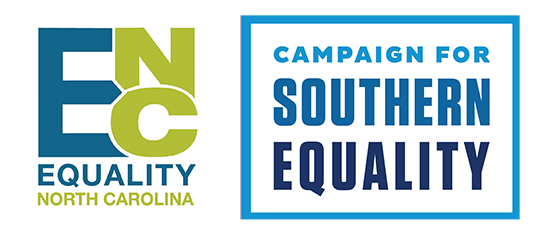
Get the Facts
What’s the state of LGBTQ nondiscrimination protections in North Carolina?
LGBTQ people in North Carolina are vulnerable to discrimination in many areas of life – including housing, healthcare, and public spaces because of a lack of statewide nondiscrimination protections.
Many North Carolinians mistakenly believe that LGBTQ people are protected from discrimination in these areas, but that’s not true. That’s why LGBTQ people need protections at the local, state, and federal levels.
A recent study found in 1 in 3 LGBTQ people – including 3 in 5 transgender people – have experienced discrimination in the past year.
North Carolinians strongly support LGBTQ nondiscrimination protections. A full 67% of people in North Carolina support protecting LGBTQ people from discrimination.
LGBTQ-inclusive nondiscrimination laws send a message that everyone’s welcome to build a life, raise a family, or start a business.
What kinds of municipal ordinances prohibiting discrimination are regulated by the North Carolina General Assembly?
No local government can regulate private employment practices.
No local government can regulate public accommodations.
Those provisions expire on December 1, 2020.
However, even after December 1, only the North Carolina General Assembly can regulate access to multiple occupancy restrooms, showers, or changing facilities.
What is North Carolina’s HB142?
HB142 was a discriminatory law passed by the North Carolina General Assembly in 2017, following the rushed passage of HB2 in 2016. Instead of fixing the problems caused by HB2, HB142 doubled down on some of the most dangerous aspects, including totally preempting municipalities from passing policies protecting LGBTQ people from discrimination.
HB142 has two prongs: the first prong, which remains in effect, prohibits entities like local governments and school systems from passing policies regarding the use of multiple occupancy restrooms; the second prong – which sunsetted on December 1 – prohibits municipalities’ from passing non-discrimination ordinances to protect their LGBTQ residents
With the state legislature blocking the passage of comprehensive nondiscrimination laws and even passing discriminatory measures like HB2 and HB142, cities and towns have long had the responsibility to look after their own residents – but HB142 denied us that right in North Carolina.
What’s possible now that one prong of HB142 expired on December 1?
Local governments will be able to enact nondiscrimination ordinances regulating private employment practices, including ordinances prohibiting discrimination based on sexual orientation, gender identity, race, color, religion, sex, age, national origin, veteran status and pregnancy.
Local governments will be able to enact nondiscrimination ordinances regulating public accommodations, which include places like hotels, restaurants, hospitals, stores, movie theaters, amusement parks.
What about the first prong of HB142?
The first prong of HB142 continues to prevent local governments and other political entities from regulating multiple occupancy restrooms, even after December 1. To address this, HB142 needs to be fully repealed by the NCGA or found unconstitutional by the courts. We are calling for the full repeal of HB142 as soon as possible.
Why do LGBTQ people need nondiscrimination protections even after June’s U.S. Supreme Court decision in Bostock v. Clayton County?
The Supreme Court decision in June holding that discrimination on the basis of sexual orientation and transgender status in employment is illegal sex discrimination is very important for LGBTQ workers.
However, the decision does not reach small business, workers in the informal economy, and independent contractors. Local governments have an important role in enacting protections for those workers.
The decision also does not explicitly or immediately protect LGBTQ people in housing, healthcare, or public accommodations.
LGBTQ people need to be protected from discrimination in every area of life under local policies, state law and federal law.
What’s next for LGBTQ protections in North Carolina?
LGBTQ people and elected officials have been having conversations around LGBTQ equality in North Carolina for a long time now, and one of our top priorities has been inclusive nondiscrimination laws.
Now, local lawmakers finally have the ability to pass LGBTQ-inclusive nondiscrimination ordinances.
We encourage LGBTQ people and allies to contact their local leaders, express their concerns about anti-LGBTQ discrimination, educate them about the harms of discrimination, and urge them to pass local protections.
Anyone can take action by using the tools at www.NCisReady.org.
